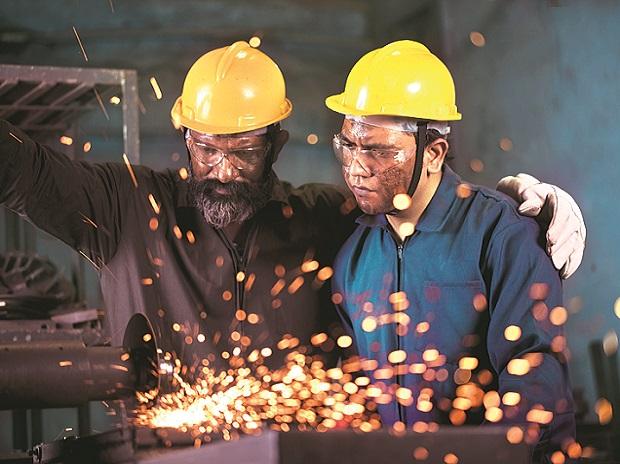India’s domestic factory orders and production contracted to an 11-month low in June as measures to contain the coronavirus put manufacturing into “reverse gear”.
The IHS Markit India Manufacturing Purchasing Managers’ Index (PMI) slipped to 48.1 in June from 50.8 in May and 55.5 in April. This was, for the first time since July 2020, below the critical no-change mark of 50. The dip came despite the fact that states eased restrictions during the period.
The latest reading shows manufacturing was in poor health, said the HIS report. The PMI averaged 51.5 in the opening quarter of fiscal year 2021-22, the lowest three-month figure since the same period one year ago.
The indices vary between 0 and 100, with a reading above 50 indicating an overall increase compared to the previous month, and below 50 an overall decrease.
“The intensification of the Covid-19 crisis in India had a detrimental impact on the manufacturing economy. Growth of new orders, production, exports and input purchasing was interrupted in June as containment measures aimed at bringing the pandemic under control restrained demand. In all cases, however, rates of contraction were softer than during the first lockdown,” said Pollyanna De Lima, Economics Associate Director at IHS Markit.
New order growth that started in August 2020 ended in June, with firms linking the deterioration in demand to the pandemic. The pace of contraction was much softer than those registered at the onset of Covid-19 last year.
New export orders decreased for the first time in ten months, albeit modestly. Falling new orders, business closures and the crisis triggered a reduction in output among Indian manufacturers. The decline was moderate relative to those seen in the first half of 2020, but ended a ten-month sequence of growth, report said.
Demand weakness and a reduction in production requirements led firms to restrict input purchasing in June. Buying levels fell at a marked pace that was among the fastest seen since data collection started in March 2005.
June data pointed to marked declines in both pre- and post production inventories. The former posted the first contraction in ten months.
Amid reports of raw material scarcity, transportation issues and states restrictions, supplier performance worsened again in June. However, average lead times lengthened only slightly.
Input costs increased further in June, with firms reporting higher prices for chemicals, electronic components, energy, metals and plastics. The rate of inflation was, however, the joint- lowest in five months (equal to May).
PMI data is released monthly in advance of comparable official economic data. It is compiled from responses to questionnaires sent to purchasing managers in a panel of around 400 manufacturers.
On the job front, companies were at their least optimistic for almost a year. “As a result, jobs continued to be shed midway through the year. The fall in employment was marginal, but took the current sequence of month-on-month contraction to 15 months,” said the report.
De Lima said that companies became increasingly worried about when the pandemic will end, which resulted in downward revisions to output growth projections. As a result of subdued optimism, jobs were shed again in June.
 Dear Reader,
Dear Reader,
Business Standard has always strived hard to provide up-to-date information and commentary on developments that are of interest to you and have wider political and economic implications for the country and the world. Your encouragement and constant feedback on how to improve our offering have only made our resolve and commitment to these ideals stronger. Even during these difficult times arising out of Covid-19, we continue to remain committed to keeping you informed and updated with credible news, authoritative views and incisive commentary on topical issues of relevance.
We, however, have a request.
As we battle the economic impact of the pandemic, we need your support even more, so that we can continue to offer you more quality content. Our subscription model has seen an encouraging response from many of you, who have subscribed to our online content. More subscription to our online content can only help us achieve the goals of offering you even better and more relevant content. We believe in free, fair and credible journalism. Your support through more subscriptions can help us practise the journalism to which we are committed.
Support quality journalism and subscribe to Business Standard.
Digital Editor

RECOMMENDED FOR YOU